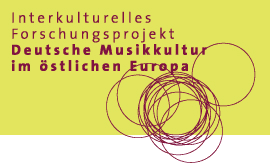

German Musical Culture in Eastern Europe
After the fall of the Iron Curtain, and now that the majority of Eastern European states have meanwhile become members of the European Union, the conditions for researching musical processes in Eastern Europe have changed quite fundamentally. The systematic opening up and development of these fields – still very much characterised by considerable research deficits – is now intricately linked to international cooperation possibilities which may also provide sustainable support for the process of Europe's growing together culturally.
Against this background, the subject matter of the project – under varying perspectives – investigates German musical culture in Eastern Europe. Here, for three years, the project has concentrated its studies at first on the aspects of "Migration, correlation and interference" (Main Areas of Research 2004-2006). Thereafter questions relating to the connection of "Music history writing and remembrance cultures" have come to the fore (Main Areas of Research 2007-2009). Meanwhile, the interests are now focusing primarily on the "Possibilities and Perspectives of museal Re/Presentations of German Music in and from Eastern Europe" (Main Area of Research since 2012). In the elaboration of the individual themes the project places particular emphasis on a close, also interdisciplinary, collaboration with German and foreign colleagues. Theoretically and methodically this work seeks to orientate itself according to the newer standards of cultural studies-historical research.
The project was established at the University of Bonn in January 2004, where it is on the one hand integrated in the Department of Musicology/Sound Studies (the former Musicology Seminar which has been dissolved since 1 October 2005) and on the other, in the interdisciplinary Zentrum für Kulturwissenschaft/Cultural Studies. Its research projects are funded generously by the German Federal Government's Representative for Culture and Media, and it considers its activities to be parallel to those of the Bundesinstitut für Kultur und Geschichte der Deutschen im östlichen Europa.